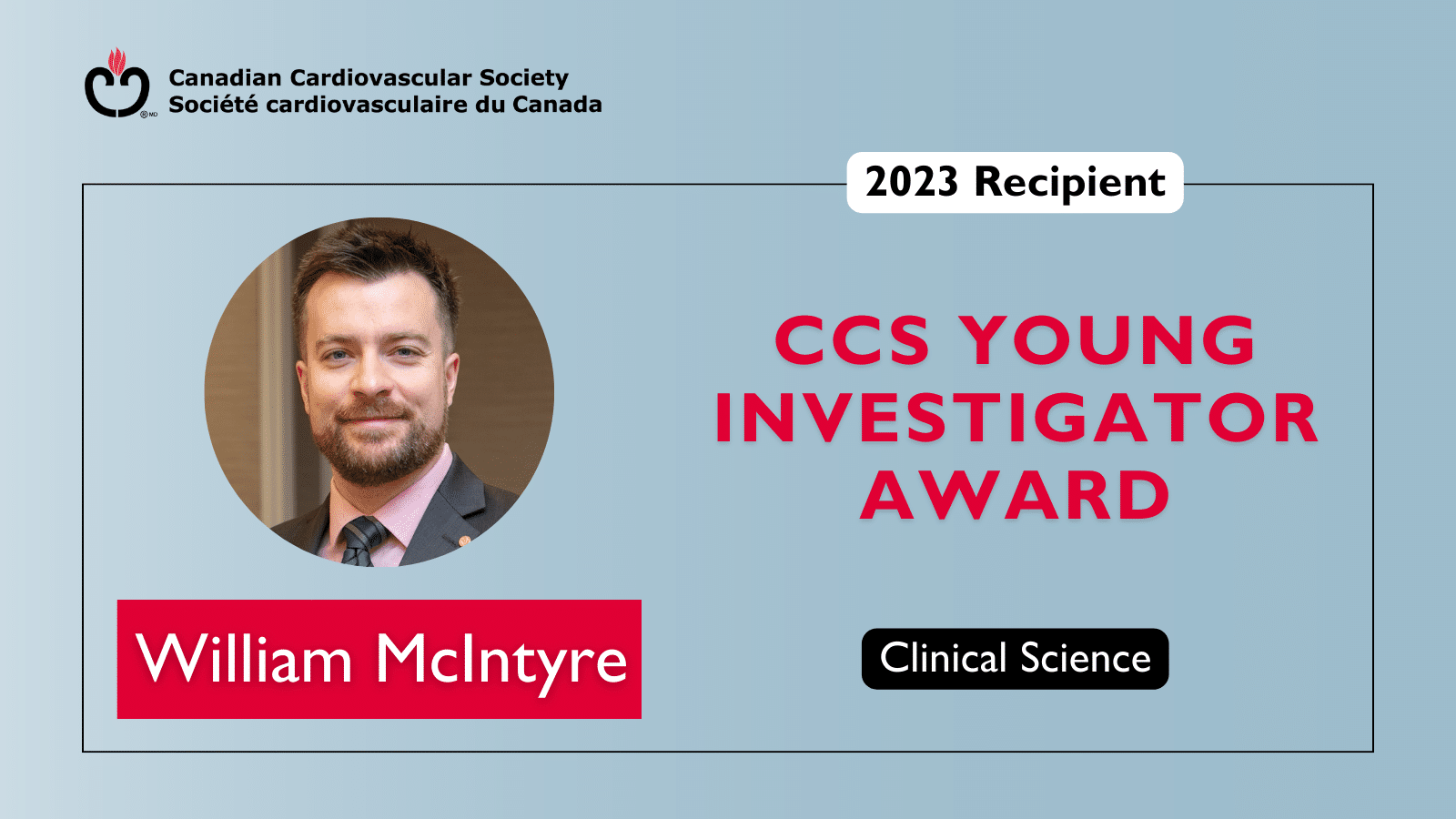
Cardiologist Dr. William McIntyre has been involved in CCS since he was a second-year medical student at Queen’s University and first attended a trainee day at the Canadian Cardiovascular Congress. Since then, he has served as co-chair of the Trainee Program Planning Committee (TPPC) in 2017 and 2018, chaired the Trainee Committee in 2019-2020, and advocated for creation of the Early Career category of CCS membership. He currently serves as chair of the Early Career Committee and is the recipient of the 2023 Young Investigator Award.
After completing medical school, Dr. McIntyre did a three-year internal medicine residency in Kingston, followed by a three-year adult cardiology residency at St. Boniface Hospital in Winnipeg. In 2016, he moved to Hamilton, completing a fellowship in Electrophysiology and Pacing and a PhD in Health Research Methodology at McMaster University. He is now an Assistant Professor of Medicine in McMaster’s Faculty of Health Sciences and an investigator at the Population Health Research Institute.
We sat down with Dr. McIntyre to find out more about his work, his involvement in CCS, and what advice he can offer trainees and early-career researchers.
Q: Dr. McIntyre, can you tell us what drew you to this particular work? The focus on arrhythmia research?
A: I had a great mentor when I was a student at Queen’s. Dr. Adrian Baranchuk had energy, drive and personality, and he was doing extensive work in arrhythmia. He introduced me to research, helped me to get training from the best, and convinced me that I could have an impact.
Q: What is your top tip for trainees and early-career CCS members?
A: If you want to be a researcher, you need formal theoretical training and commitment, but you also need practical training, mentorship and supervision. You need to go out there and do research studies with the best in the field. For me, that happened after I chased down one of “the masters” in our field, Dr. Jeff Healey, in the Vancouver airport after the Cardiovascular Congress about eight years ago. I told him that I wanted to do research with him and he asked me to send him my best five ideas. A week later he got back to me and said that I was onto something with an idea on AFOTS (atrial fibrillation occurring transiently with stress). I presented the final results of that research at CCC-Vascular this year.
Q; What do you think has made the biggest impact on your career so far?
A: The sense of community within the Canadian Cardiovascular Society, Canadian Heart Rhythm Society, and even the European Heart Rhythm Association. All around me, there are these wonderful organizations, communities of people who are really driven to come together for a unified purpose. They are advancing patient care through educational and research initiatives.
Q: What do you wish the public knew about the Canadian cardiovascular health-care system?
A: It’s driven by technology and innovation. We are always using new and better diagnostic machines and interventions. Cardiology has a rich culture of solid scientific research. So, when a therapy comes out, you can believe the community has tested it on tens of thousands of patient volunteers. It’s also important to understand the role patient volunteers play in moving care forward by participating in research studies.
Q: Why do you think CCS membership is important? Why are you a member?
A: CCS membership is engagement with the community. The CCS is the best vessel to be exposed to new ideas and other perspectives. A lot of people are so specialized that they are the only expert in their city or province. At CCS or its umbrella societies, you can find people with common goals and problems. Add to that, the CCS is the primary vector for education in Canada, and it also does a really good job keeping an eye on the three mega-societies in the world – the American College of Cardiology, American Heart Association and European Society of Cardiology – to make sure that content is filtered and interpreted with a Canadian lens.
Q: What is your favourite part of your job?
A: I like to identify problems day-to-day and then work to gather evidence to chip away at them through research. It’s rewarding to design a study, gain new insights, and then try to change clinical practice.
